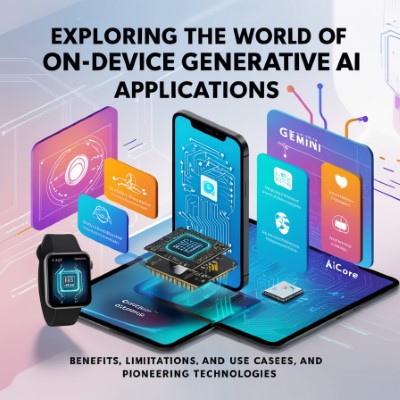On-device GenAI (Generative Artificial Intelligence) applications refer to AI models and systems that run directly on a user’s device, such as a smartphone, tablet, or computer, rather than relying on cloud-based servers. These applications can generate content, provide insights, or perform tasks using advanced AI techniques, all while keeping the data and processing local to the device.
On-device GenAI: Next-Gen AI in Your Pocket
Generative Artificial Intelligence (GenAI) is revolutionizing numerous industries by enabling machines to generate content, provide insights, and perform complex tasks. Traditionally, these AI models have been hosted on powerful cloud servers, leveraging vast amounts of computational resources and data. However, the landscape is rapidly shifting towards on-device GenAI applications, bringing the power of AI directly to our personal devices. This transformation offers a host of benefits, opens up new possibilities, and introduces unique challenges.
Benefits of On-device GenAI Applications
1. Enhanced Privacy: One of the most significant advantages of on-device GenAI is improved data privacy. Since data processing occurs locally, sensitive information does not need to be transmitted to external servers, reducing the risk of data breaches and unauthorized access.
2. Reduced Latency: By eliminating the need for data transfer to and from cloud servers, on-device AI can provide real-time responses, making applications more responsive and user-friendly. This is particularly crucial for tasks requiring immediate feedback, such as augmented reality (AR) applications and voice assistants.
3. Offline Functionality: On-device GenAI applications can operate without an internet connection, making them invaluable in areas with limited or no connectivity. This offline capability ensures that essential services remain available at all times.
4. Personalized Experiences: On-device AI can leverage the unique data stored on individual devices to provide highly personalized experiences. From tailored recommendations to custom content generation, the ability to adapt to individual user preferences is a key advantage.
Limitations of On-device GenAI Applications
1. Hardware Constraints: Unlike cloud servers, personal devices have limited computational power, memory, and storage. This can restrict the complexity and size of AI models that can be run on the device.
2. Battery Consumption: Running AI models locally can be power-intensive, potentially leading to faster battery drain. Developers need to optimize their applications to balance performance and energy efficiency.
3. Update Challenges: Deploying updates and improvements to AI models across numerous devices can be more complex compared to updating a single cloud-based model.
Common Use Cases for On-device GenAI Applications
- Voice Assistants: On-device AI enhances the responsiveness and privacy of voice assistants like Siri and Google Assistant, enabling faster and more secure interactions.
- Image and Video Editing: Applications like Adobe Photoshop and mobile photo editors utilize on-device AI to provide real-time enhancements, filters, and effects without needing an internet connection.
- Language Translation: Apps like Google Translate offer offline translation capabilities by leveraging on-device AI models, making communication seamless even in remote areas.
- Health and Fitness: Wearable devices and health apps use on-device AI to monitor and analyze health data in real-time, providing personalized recommendations and alerts.
Gemini Nano and AICore: Pioneering On-device GenAI
Two notable advancements in on-device GenAI are the Gemini Nano and AICore technologies. These innovations are designed to empower developers and enhance the capabilities of on-device AI applications.
Gemini Nano: This compact yet powerful hardware accelerator is tailored for on-device AI tasks. Gemini Nano provides the computational power needed to run sophisticated AI models efficiently on personal devices. Its design focuses on energy efficiency, ensuring that AI applications do not excessively drain device batteries.
AICore: AICore is a comprehensive AI development framework that simplifies the creation and deployment of on-device GenAI applications. It provides tools and libraries optimized for various devices, allowing developers to build, test, and deploy AI models seamlessly. AICore supports a wide range of AI tasks, from natural language processing to computer vision, enabling developers to harness the full potential of on-device AI.

Access to Developers and the Gemini Nano App Showcase
To foster innovation and collaboration, Gemini Nano and AICore offer extensive support and resources to developers:
Developer Access: Developers can access detailed documentation, tutorials, and sample code to get started with on-device GenAI. Community forums and support channels provide a platform for sharing knowledge, troubleshooting issues, and collaborating on projects.
Gemini Nano App Showcase: The Gemini Nano App Showcase highlights exemplary on-device AI applications, providing inspiration and recognition for developers. This platform showcases innovative uses of on-device AI, from groundbreaking health apps to creative content generation tools.
Conclusion
On-device GenAI applications represent a significant leap forward in the AI landscape, bringing the power of advanced machine learning directly to our fingertips. While there are challenges to overcome, the benefits of enhanced privacy, reduced latency, offline functionality, and personalized experiences are driving rapid adoption. Technologies like Gemini Nano and AICore are paving the way for developers to create powerful, efficient, and innovative on-device AI applications. As this field continues to evolve, we can expect to see even more transformative uses of on-device GenAI in our daily lives.
